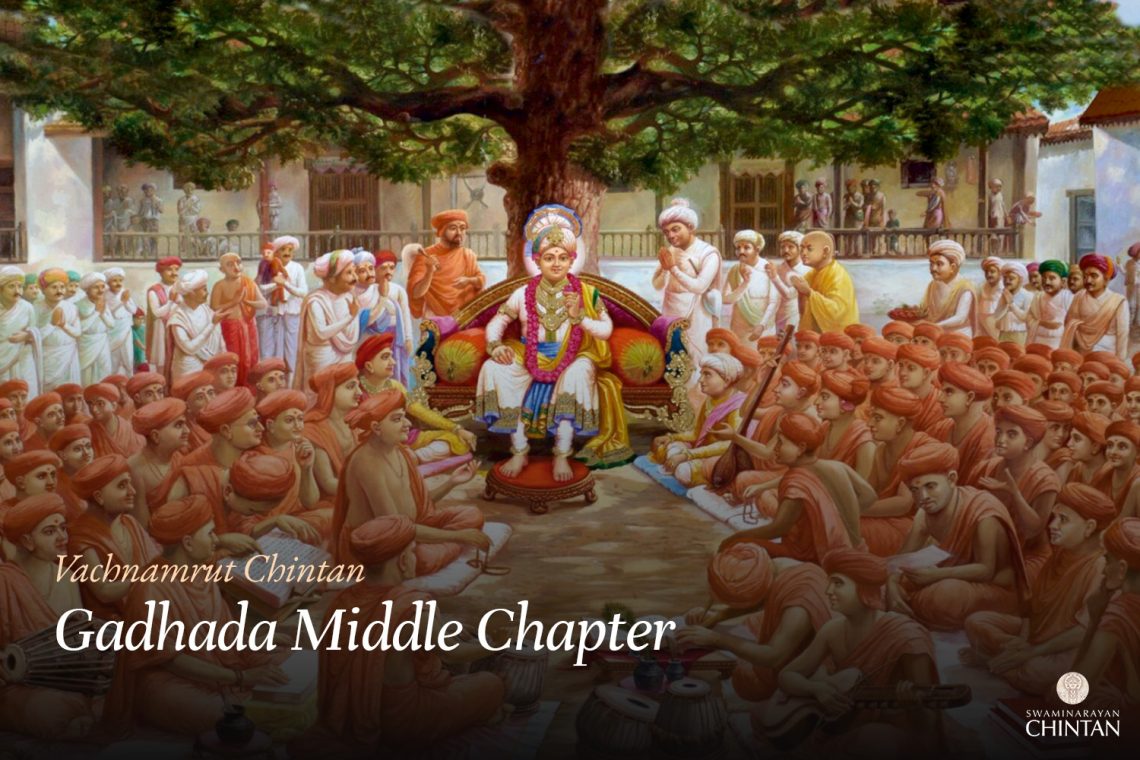Central Insights:
- Do individuals in samadhi (spiritual trance) experience an increase in knowledge and the strength of the senses?
Key Points:
- An individual in samadhi experiences an increase in knowledge.
- Those who follow the path of renunciation (nivṛtti dharma) experience an increase in the strength of the body and senses through the practice of yoga.
Explanation:
In this Vachanamrut, the topic of discussion is whether individuals in samadhi experience an increase in knowledge and the strength of the body and senses. The santo were unable to provide a definitive answer, so Maharaj Himself clarified: When a jiva (soul) enters samadhi, the senses abandon their outward perception, and by merging with Brahm (the Supreme), the soul also attains the form of Brahm and experiences an increase in knowledge.
Maharaj states that when the senses relinquish their external perception and the soul unites with Brahm through samadhi, its power of knowledge becomes unclouded, and its consciousness becomes exceptionally pure. As a result, the power of knowledge becomes immensely strong. Even when the soul returns to the body after emerging from samadhi, it does not lose the memory of its experience with Brahm. The memory of that experience remains with the soul permanently. Having intensely experienced the bliss of Brahm in samadhi, when the soul comes out of it, everything else in the world seems dull and devoid of pleasure. Therefore, even during the waking state, the soul’s inner vision remains focused on its Antaratma (inner self), causing the body, senses, and mind to seem insignificant and irrelevant. To ordinary souls attached to the body, it may seem as if the individual has lost awareness or understanding after coming out of samadhi, but that is not the case. In fact, the soul’s vision has turned away from the world and become more deeply focused on Bhagwan, which diminishes the importance of worldly knowledge.
Maharaj explains that the soul attains the state described by Bhagwan Shree Krishna in the Gita:
या निशा सर्वभूतानां तस्यां जागर्ति संयमी ।
यस्यां जाग्रति भूतानि सा निशा पश्यतो मुनेः ॥
Yā niśā sarva-bhūtānām tasyām jāgarti saṁyamī;
Yasyām jāgrati bhūtāni sā niśā paśyato muneḥ.
(Gita 2.69)
(That which is night for all beings, is the time of awakening for the saṁyamī (self-controlled one); and that which is the time of awakening for all beings is night for the muni (sage) who sees.)In the state where worldly beings are asleep, meaning they are not engaged in the worship of Bhagwan, the self-controlled person is awake, meaning they are engaged in bhajan (devotion). Conversely, where worldly beings are awake, indulging in sensory pleasures, the self-controlled person is asleep, meaning they do not partake in such pleasures. Thus, the one who is in samadhi experiences an increase in knowledge both during and after samadhi. However, the strength of the body and senses does not increase through samadhi alone. It only increases when one engages in tapas (austerities), follows nivṛtti dharma (the path of renunciation), and practices vairagya (detachment) along with yoga. When such a state of perfection is achieved, similar to that of Narad, Sanakadik, and Shukdevji, the soul can travel to the abodes of Bhagwan such as Shwetadweep in this very body and return as well. The soul is able to traverse all worlds, but those on the path of pravṛtti dharma (worldly duties) do not attain such perfection. They experience an increase in knowledge and attain a state similar to that of King Janak.
Glossary
| Samadhi – Deep meditative state A state of deep, focused meditation, where the body remains unconscious and the mind is absorbed in God and divine experience |
| Gyan-Shakti – Power of knowledge The enhanced capacity for understanding and realization experienced during and after samadhi. |
| Nivruti Dharma – Path of renunciation A spiritual path focused on detachment from worldly activities and dedication to Bhagwan. |
| Pravruti Dharma – Path of worldly duties A path focused on fulfilling one’s worldly responsibilities while maintaining devotion to Bhagwan. |
| Antaratma – Inner self |
| Vairagya – Detachment From Everything Except God |
| Tapas – Austerities |
| Brahm – Supreme Reality, God The ultimate truth in Vedanta, often misinterpreted by dry Vedantists. |
| Shwetadweep – Divine abode of Bhagwan A spiritual realm where liberated souls and perfected beings reside with Bhagwan. |
| Bhajan – Devotion |
| Tapa – Austerities |

